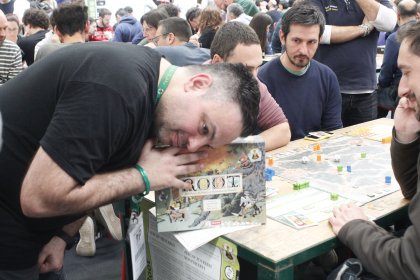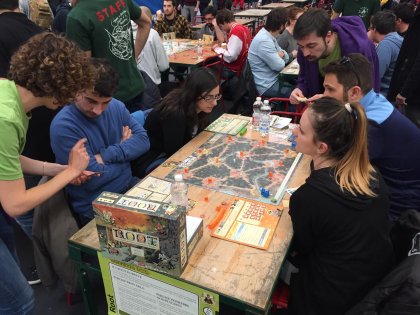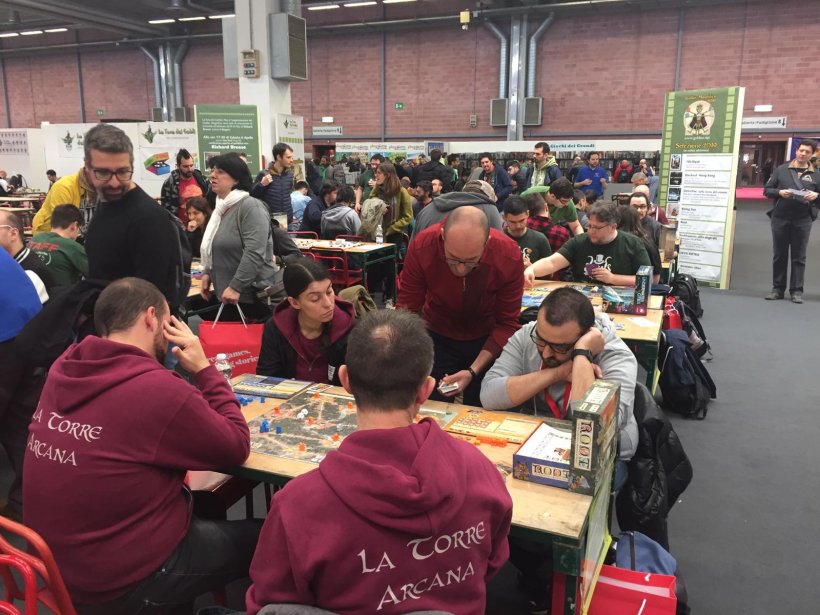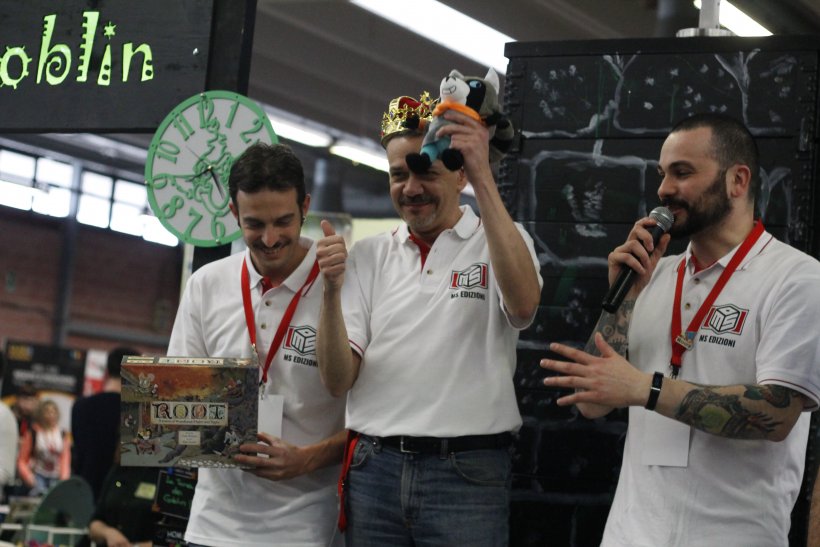
bella intervista e direi che i suoi gusti ludici mi piacciono parecchio :)

Iniziamo le interviste per gli autori della nostra Magnifica selezione con il plurivincitore Root. In attesa di poterlo conoscere alla prossima Play (siamo già a lavoro…) il simpaticissimo Cole Wehrle saluta calorosamente tutta la nostra comunità. Buona lettura!

Mi considero un onnivoro in fatto di giochi. Negli ultimi mesi ho giocato wargame da 8 ore, ferroviari, euro e semplici party game. La sola costante è l’interazione. Quando mi siedo per giocare devo poter adeguatamente contrastare I miei avversari. Alcuni tra I miei giochi preferiti sono Age of Steam, 1889, Titan, e The Great Zimbabwe.
2) Tutti I tuoi precedenti lavori hanno una preponderante tematica storica (in particolare l’Impero Britannico del ‘700). Perché hai scelto un divertente tema fantasy in questo caso?
La risposta più semplice è che non l’ho scelto. Quando Patrick (uno dei due capi della Leder games, ndr) mi ha dato l’idea generale di un gioco asimmetrico, l’ambientazione era una domanda aperta e avevamo alcune diverse impostazioni in ballo. Patrick e Kyle (l’altro capo della Leder games, ndr) suggerirono entrambi di adattare il tema fantasy che era stato sviluppato per un altro gioco. Appoggiai subito l’idea. Avevo da tempo voglia di fare un gioco per parafrasare gli animali. Una volta iniziato a costruire il gioco in questo mondo fittizio sono emerse un sacco di cose interessanti. La scoperta più grande è stata che le simpatiche bestiole ci hanno permesso di rendere il gioco molto più viscido ed esplorare tematiche politiche molto più cupe e complesse senza il vincolo di un setting storico.
3) In tutti i tuoi giochi troviamo un sottile equilibrio tra le parti: militare (An Infamous Traffic), economica (John Company), o entrambi (Pax Pamir). Sono presenti anche in Root. Perché dai ai tuoi giochi queste caratteristiche e questo segno distintivo?

Penso che le storie più interessanti derivino dalla tensione. Quando ho iniziato a sviluppare John Company avevo chiaro che tipo di tensione volessi esplorare. Nella maggior parte dei giochi, i giocatori devono chiedersi quando vogliono convertire la loro posizione da costruzione del motore a punti vittoria (ad esempio, quando inizi a spedire in Puerto Rico). In John Company volevo spostare il controllo di quel momento dal giocatore e renderlo soggetto alla negoziazione. Questo crea molta tensione sulla tempistica e molti dei sistemi economici del gioco sono costruiti attorno ad esso.
Suppongo che le caratteristiche dei miei giochi derivino dal fatto che hanno più condizioni di vittoria. Mi piace il fatto che i giocatori possano delineare dove trovare il “vero” gioco. Se inizi a perdere una partita, forse puoi cambiare il gioco stesso. Un titolo moderno che rispetto davvero è Triumph and Tragedy di Craig Besinque. Il gioco è un capolavoro su questo aspetto e vale veramente la pena esplorarlo, specialmente per i designer che non prestano attenzione ai wargame.
4) Root è stato definito un gioco simile al genere dei COIN. Sei un fan della famosa serie della GMT di Volko Runkhe? In caso positivo quali sono state le tue principali fonti di ispirazione?
Adoro i COIN e li ho giocati sin dal primo Andea Abyss del 2012. Non penso siano giochi perfetti, sono giochi che amo e di cui amo discutere. Root è ispirato alla tensione che creano, più che ad uno specifico meccanismo. Durante lo sviluppo stavo giocando tanto a Cuba Libre e sono sicuro che alcuni suoi aspetti sono penetrati nel mio design.
5) Quanto è difficile bilanciare un gioco come questo? Pensi che un'app con un'IA (finanziata durante la campagna di Kickstarter) possa aiutare a bilanciare meglio i giochi asimmetrici? O pensi che i giocatori dovrebbero bilanciare le fazioni da soli, semplicemente giocando contro quelli più forti?
Il bilanciamento è sia banalmente facile che incredibilmente difficile. È facile perché qualsiasi sistema interattivo come Root permetterà ai giocatori di creare uno stato di gioco "bilanciato". D'altra parte, è difficile perché con l'espandersi del gioco ci sono un numero incredibile di interazioni differenti. Non tutte queste interazioni portano a dinamiche utili e devi costruirle in modo che siano abbastanza robuste.
Per me il problema principale del cattivo bilanciamento è che fa sembrare la strategia della fazione forte inquadrata. Quindi abbiamo lavorato duramente per assicurarci che ogni fazione abbia una vasta gamma di strategie che possono impiegare e che possano adattarsi a una vasta gamma di avversari. Allo stesso tempo si vuole evitare di correggere eccessivamente. Una delle cose che preferisco di Root è il suo cambiare con i giocatori. In alcune partite la Dinastia Eyrie (i falchi, ndr) è fortissima, in altre è deboluccia. Un buon bilanciamento, per me, deve preservare questo dinamismo.

Sicuramente. Root sarebbe assai più difficile da bilanciare se fosse giocato sempre con lo stesso setup e con un mazzo carte ordinato. La varietà del gioco ci consente una scappatoia e usiamo questa debolezza per raccontare delle storie avvincenti tramite il design. Questa variabilità ci porta anche a non reagire in maniera drastica ad un cattivo playtest. Se qualcosa va storto in una partita, di solito riprendiamo lo stesso set up e le stesse fazioni e ci assicuriamo che ci sono altri sbocchi per il gioco.
7) Hai deciso di gestire il combattimento con i dadi. Perché questa scelta? Non era meglio qualcosa di più controllabile, per esempio con delle carte?
Originariamente Root aveva un sistema di combattimento alquanto complicato, basato su botta e risposta. Mi piaceva molto, ma richiedeva troppo tempo. Il sistema con i dadi è stato un tentativo di creare qualcosa di rapido, ma che fornisse pressappoco gli stessi risultati del sistema più complesso, Sebbene non possa sembrare, Root è fondamentalmente un wargame su scala operazionale. Su questa scala non voglio dare ai giocatori troppo controllo sul risultato di una battaglia. Un po’ di distanza dalla prima linea aiuta i giocatori a sentirsi leader della propria fazione.
8) Riprendiamo il discorso sulle fazioni così estreme: sia Vast che Root non solo hanno fazioni con poteri diversi, ma anche regole diverse. Pensi che questo nuovo modalità possa essere sempre più interessante ed esplorata sia per i game designer che per i giocatori?
Penso ci sia un sacco di spazio da esplorare su questo argomento. Potrei felicemente spendere i prossimi anni della mia vita ad arricchire il mondo di Root, e so che Platrick ha un sacco di idee su Vast. Questo sebbene consideri l’asimmetria secondaria a quella che vedo come missione principale per la nostra azienda. Stiamo cercando di creare giochi in grado di raccontare storie possenti e che si fanno distinguere. L'asimmetria radicale ci ha permesso di fare proprio questo, ma non è certamente l'unico modo.
9) Hai giocato gli altri sette giochi della selezione (18Lilliput, Blackout: Hong Kong, Detective, Rising Sun, Root, Teotihuacan, Tokyo Metro, Underwater Cities)? Cosa ne pensi?

Ne ho giocati molti. Cerco sempre di provare tutte le nuove uscite annuali. Penso che nell’anno passato ci siano dei bei giochi. Mi è piaciuto particolarmente Tokyo Metro, lo considero un gioco adorabile ed intelligente. Sono curioso di vedere cosa farà Jordan Draper in futuro.
10) Su quali nuovi giochi stai lavorando? Dicci qualcosa sui tuoi futuri progetti.
Ora come ora, sono al lavoro su di un progetto molto grande per Leder Games. Dal completamento di Root ho cominciato la parte di preparazione e studio dei concetti generali (che saranno alla base del gioco stesso). Il prototipo da continuare a sviluppare e che ora è una bozza dovrebbe vedere la luce in estate. Proprio come Root, sarà un gioco strategico. Tuttavia, laddove Root era principalmente un gioco di geopolitica, questo sarà un progetto sulla storia: quella che viene ricordata e quella che viene dimenticata. Sarà un gioco “legacy”, inteso come eredità storica, ma si proporrà come antitetico all’idea di “legacy” inteso come genere di gioco. Non ho purtroppo modo di divulgare molto, ad ora, ma credetemi quando dico che questo è il progetto più accattivante ed allo stesso tempo difficile della mia carriera... e non vedo l’ora di potermi sbottonare un po’ di più con tutti voi.
Salutiamo Cole, ringraziandolo per questa bella intervista e gli diamo appuntamento a Play!

1) Tell us something about you: what kind of player are you? Tell us your favourite games (not made by you).
I consider myself a gaming omnivore. In the past few months I've played 8 hour wargames, train games, euros, and silly party games. The one constant is interaction. When I sit down to play a game, I want to push and pull against my fellow players. Some of my favorite games are Age of Steam, 1889, Titan, and The Great Zimbabwe.
2) All your previous games have a strong historic theme (in particular the '700 British Empire). Why did you chose a funny fantasy theme for this one?
The simplest answer is that I didn't. When Patrick gave me the general concept of an asymmetric game to me, theme was an open question and we had a few different settings on the table. Patrick and Kyle both suggested we adapt the animal fantasy setting that was being developed for another game. I was on-board immediately. I had been wanting to do an animal parable game for awhile. Once we started building the game in that world, a bunch of interesting things became apparent. The biggest realization was that the cute animals allowed us to make the game a lot more viscous and explore darker, more complex political themes without the baggage of a historical setting.
3) In all your games we find a subtle balance between parts: military (An Infamous Traffic), economic (John Company), or both (Pax Pamir). And in Root it is present too. Why do you give your games this attitude and signature mark?
I think the most interesting stories come from tension. When I started John Company, I had a very clear tension I wanted to explore. In most games, players have to ask themselves when they want to convert their position from engine-building to scoring victory points (for example, when do you start shipping in Puerto Rico). In John Company I wanted to take control of that timing from the player and make it subject to negotiation. This creates a lot of timing tension and many of the game's economic systems are built around it.
I suppose it follows then that most of my games have multiple victory conditions. I like the notion that players can be in control of the definition of where the "real game" is to be found. If you start losing a game, perhaps you can change the game itself. One modern title I really respect is Craig Besinque's Triumph and Tragedy. The game is essentially a masterclass on this exact subject and is well worth exploring, espeically for designers who normally don't pay attention to wargames.
4) Root han been defined as a COIN-like game. Are you a fan of the famous GMT serie by Volko Runkhe? And if yes, which are your main sources of inspiration?
I adore GMT's COIN games and have been playing them since Andean Abyss first came out back in 2012. I don't think they are perfect games, and they are games that I both love and love to argue about. Root was inspired by the tension they create more than any specific mechanism. During development, I was playing a lot of Cuba Libre, and I'm sure some of that seeped into the design.
5) How difficult is to balance a game like this? Do you think an app with an AI (financed during the Kickstarter campaign) could help balancing better asymmetrical games? Or do you think players should balance the factions by themselves, simply playing against the strongest ones?
Balance is both trivially easy incredibly difficult. It's easy because any system as interactive as Root will allow players to create a "balanced" game state. On the other hand, it's difficult because as the game is expanded there are an incredible number of different interactions. Not all of these interactions create worthwhile games and you have to build them in ways that are quite resilient.
For me, the main trouble with imbalance is that it makes the strong faction's strategy feel scripted. So we work hard to make sure that each faction has a wide variety of strategies they can employ and that they can adapt to a wide variety of adversaries. At the same time, you don't want to over-correct. One of my favorite things about Root is how different each player combination feels. In some match-ups the Eyrie Dynasties is very strong, and in others they are quite weak. Good balance, for me, must preserve that dynamism.
6) Nowadays a lot of games have a pronounced asimmetry among factions. But time for playtesting a game is less and less (due to short editing deadlines). We noticed that a strong asimmetry is always associated with great variability: could it be a smart way to hide some possible imbalance?
Sure. Root would be a much harder game to balance if it was always played with the same setup and the same deck order. The game's variance lets us get away with a lot, and we try to use that slack to tell some compelling stories with the design. Because of this variance, we are also careful not to overreact to a bad playtest. If something goes wrong in a game, we will usually set up the exact same faction combination and make sure that there were other ways the game might have gone.
7) For fighting you choose a dice rolling mechanism. Why this choice and not something more controllable, maybe related with cards?
Originally Root had a somewhat complicated call-and-response battle system. I quite liked it, but it took too long. The dice system was an attempt to create something that was executed quickly but produced nearly the same results as the more complex system. Though it may not look like it, Root is fundamentally a wargame at the operational scale. At this scale, I didn't want to give players too much control over the outcome a battle. A little distance from the front-line goes a long way in helping players inhabit their position as the leader of their faction.
8) So extreme different factions: both Vast and Root not only have factions with different powers, but even different rules. Do you think this new way could be more and more interesting and explored for both game designers and players?
I think there's a lot of room in this space to explore. I could happily spend the next few years of my life fleshing out the world of Root, and I know Patrick has plenty of new Vast content in the wings. Ideally though the asymmetry is secondary to what I see as the core mission of the company. We're trying to make games capable of telling powerful, emergent stories. Radical asymmetry has allowed us to do just that, but it's certainly not the only way.
9) Did you played the other seven games in the selection (18Lilliput, Blackout: Hong Kong, Detective, Rising Sun, Root, Teotihuacan, Tokyo Metro, Underwater Cities)? What do you think about them?
I've played most of them. I do my best to play all of the new titles each year. I thought last year had some lovely games. I espeically enjoyed a recent play of Tokyo Metro, which I think is a lovely and clever game. I'm excited to see what Jordan Draper does next.
10) What new games are you working on? Tell us something about your future projects.
Right now I'm working on a very big game for Leder Games. Since finishing Root I've been doing background reading and working on the general concepts. Primary design and development will begin in earnest this summer. Like Root, it's a strategy game. But, whereas Root was very much a game about geopolitics, this project is about history itself--what gets remembered and what gets forgotten. It's a game about legacy in the general sense, but is something of an anti-legacy game in terms of its genre. I can't share too much right now, but I'm finding this to be the most interesting and difficult project of my career so far and I can't wait to show everyone more.


bella intervista e direi che i suoi gusti ludici mi piacciono parecchio :)
E' un autore che amo sin dal suo primo titolo e non mi ha deluso nelle sue successive opere, portandomi ad acquistare tutta la sua ludografia (facile eh)
Apprezzo molto la sua sincerità riguardo il tema variabilità/bilanciamento
Autore interessante e persona molto disponibile, sarà un piacere conoscerlo a Play
I suoi gusti sono molto affini ai miei☺
Beh uno che ne sa a pacchi e soprattutto sa innovare...cosa sempre meno scontata
Io mi sono cimentato nel tradurre le regole del suo John Company, x cui non posso non apprezzarlo o non lo avrei fatto per un altro gioco...
Non vedo l'ora che arrivi Play per andare a fargli firmare la mia scatola :D
-Sarà un gioco “legacy”, inteso come eredità storica, ma si proporrà come antitetico all’idea di “legacy” inteso come genere di gioco -
Me lo ha già venduto in pratica
Ho idea che sia un gioco di parole per indicare un normale gioco a campagna con "sorprese" nella trama, ma rigiocabile, quindi da non distruggere.-Sarà un gioco “legacy”, inteso come eredità storica, ma si proporrà come antitetico all’idea di “legacy” inteso come genere di gioco -
Me lo ha già venduto in pratica
Bell'intervista, molto interessante..e poi Root è proprio un gioiellino.
Direi che è molto probabile...ma quel dire non dire ha messo in allerta il peggio di me XD
Per scrivere un commento devi avere un account. Clicca qui per iscriverti o accedere al sito
Accedi al sito per commentare© 2004 - 2023 Associazione Culturale - "TdG" La Tana dei Goblin
C.F./P.IVA: 12082231007 - P.le Clodio 8, 00195 Roma
Regolamento del sito | Archivio | Informativa privacy e cookie | Contatti
La Tana dei Goblin protegge e condivide i contenuti del sito in base alla seguente licenza Creative Commons: Attribuzione - Non Commerciale - Condividi allo stesso modo, v.4.0. Leggi il testo sintetico, oppure il testo legale della licenza.